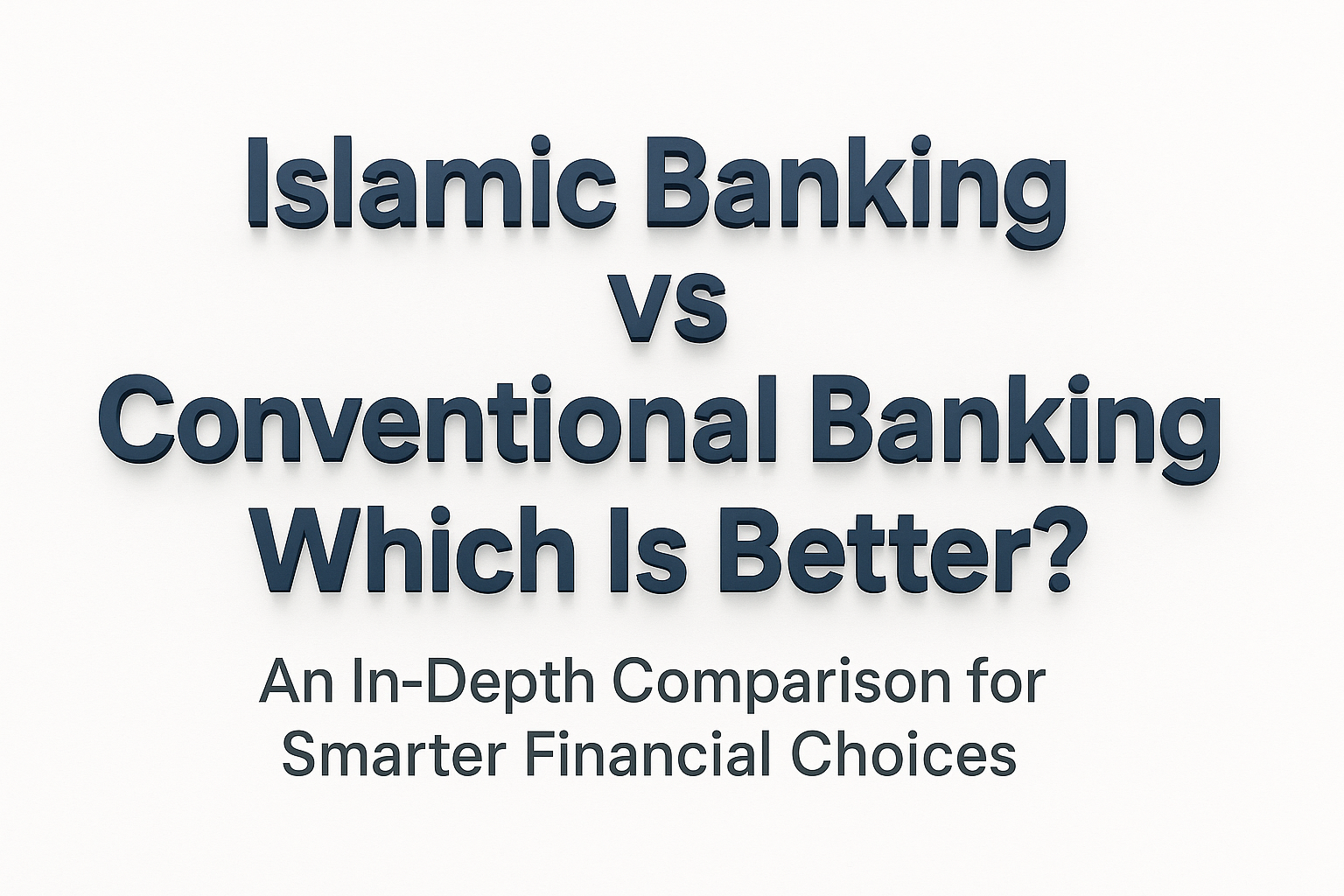The banking sector plays a pivotal role in the financial health of individuals, businesses, and entire economies. Over the decades, two distinct systems have evolved to serve the global population—Islamic banking and conventional banking. While both offer similar services such as savings accounts, loans, and investment opportunities, their underlying principles differ significantly.
In this comprehensive guide, we will delve into the major differences, advantages, disadvantages, and real-world applications of both Islamic and conventional banking systems. By the end of this article, you will be equipped with the knowledge to decide which model best suits your financial needs and ethical values.
Table of Contents
- What is Islamic Banking?
- What is Conventional Banking?
- Key Differences Between Islamic and Conventional Banking
- Principles of Islamic Finance
- Common Products in Islamic vs Conventional Banking
- Advantages of Islamic Banking
- Disadvantages of Islamic Banking
- Advantages of Conventional Banking
- Disadvantages of Conventional Banking
- Which is Better? A Comparative Analysis
- Final Thoughts
- FAQs
What is Islamic Banking?
Islamic banking, also known as Sharia-compliant banking, is a system of banking that operates in accordance with the Islamic law (Sharia). Unlike conventional banks, Islamic banks do not charge or pay interest (Riba), and all transactions must be backed by tangible assets or services.
Islamic banks promote ethical investing, risk-sharing, and socio-economic justice. They are structured around profit-and-loss sharing, trade-based financing, and leasing instead of traditional debt-based lending.
Readmore: Real Estate Investment Tips for Beginners: A Complete Guide to Getting Started
What is Conventional Banking?
Conventional banking refers to the traditional banking system that is widely used around the world. It operates on a profit-maximization model where interest (Riba) is central to most transactions. Customers deposit money, and banks lend it out at a higher interest rate to earn profits.
Conventional banks are regulated by secular financial laws and are designed primarily for economic efficiency and growth, often with little to no concern for religious or ethical considerations.
Key Differences Between Islamic and Conventional Banking
| Aspect | Islamic Banking | Conventional Banking |
|---|---|---|
| Core Principle | Sharia-compliant, interest-free | Interest-based transactions |
| Objective | Ethical, equitable financial services | Profit maximization |
| Interest (Riba) | Prohibited | Permitted and central to operations |
| Risk Sharing | Yes (Profit-and-loss sharing) | No (Risk transferred to borrower) |
| Investments | Only Halal (permitted) activities | All legal investments, regardless of ethics |
| Regulation | Sharia boards + Central bank | Central bank only |
Principles of Islamic Finance
Islamic banking is rooted in several key principles derived from the Quran and Hadith:
- Prohibition of Riba (Interest): Islam forbids charging interest on loans. Profit should come from legitimate business activity, not from money itself.
- Risk Sharing: Profits and losses are shared among stakeholders, ensuring a more equitable distribution of wealth.
- Asset-Backed Financing: Every financial transaction must be backed by tangible assets, preventing speculation (Gharar).
- Ethical Investments Only: Investment in businesses that deal in alcohol, gambling, pork, or anything considered haram is strictly forbidden.
- Transparency and Fairness: Contracts must be clear, and no party should be unjustly enriched at the expense of another.
Common Products in Islamic vs Conventional Banking
| Product Type | Islamic Banking | Conventional Banking |
|---|---|---|
| Savings Account | Mudarabah-based (profit-sharing) | Interest-bearing account |
| Loans | Qard Hasan (benevolent loan), Murabaha | Interest-based lending |
| Mortgage | Ijara (leasing) or Diminishing Musharakah | Interest-based home loan |
| Investment Account | Mudarabah or Musharakah | Fixed or variable interest returns |
| Credit Card | Islamic credit cards (no interest) | Interest-charging credit cards |
Advantages of Islamic Banking
1. Ethical and Moral Values
Islamic banking adheres to strict ethical guidelines that promote transparency, honesty, and fair dealing, which can attract customers looking for socially responsible banking.
2. Risk Sharing
Both lender and borrower share the risks and rewards. This promotes a more balanced and equitable financial relationship.
3. Prohibition of Speculation
Islamic banking forbids Gharar (excessive uncertainty), encouraging more stable and less risky investments.
4. Economic Justice
By eliminating interest and encouraging profit-and-loss sharing, Islamic banks aim to reduce the wealth gap and promote inclusive growth.
5. Sharia Compliance
For Muslims, Islamic banking aligns financial dealings with religious beliefs, ensuring peace of mind and spiritual integrity.
Disadvantages of Islamic Banking
1. Limited Availability
Islamic banking is not as widespread as conventional banking, especially in non-Muslim-majority countries.
2. Higher Transaction Costs
Due to the complexity of Sharia-compliant contracts, operational costs can be higher.
3. Lack of Standardization
Different interpretations of Sharia law can lead to inconsistencies in financial products across institutions and regions.
4. Slower Growth
Due to risk-averse nature and stricter compliance, Islamic banking may grow slower than its conventional counterpart.
Advantages of Conventional Banking
1. Widespread Access
Conventional banks are available in almost every corner of the world, making them easily accessible.
2. Simple and Standardized
The structure and operations of conventional banks are well-understood and standardized globally.
3. Wide Range of Products
From loans to investment options, conventional banks offer a broader suite of services than most Islamic banks.
4. Faster Processing
Conventional banks can often process loans and transactions more quickly due to less stringent regulatory and ethical filters.
Disadvantages of Conventional Banking
1. Interest-Based System
Charging interest can lead to unjust enrichment and exploitation, especially in high-debt scenarios.
2. Ethical Concerns
Investments are often made without consideration for moral or religious values, including industries like alcohol and gambling.
3. Wealth Inequality
Conventional banks tend to favor wealthy clients, potentially widening the economic divide.
4. High Risk of Debt
With easy access to credit and interest-laden loans, customers may fall into long-term debt traps.
Which is Better? A Comparative Analysis
The answer to whether Islamic banking is better than conventional banking depends largely on the individual’s values, financial goals, and location.
For Ethical Banking:
Islamic banking clearly offers a more ethical framework for finance. It aligns profit with morality, ensures fairness in dealings, and excludes harmful industries.
For Accessibility and Speed:
Conventional banks win in terms of global reach, convenience, and faster services. If you’re looking for ease and variety, they are the more pragmatic choice.
For Business Owners:
Islamic banking can be beneficial for businesses that value partnership models and want to avoid interest-based debt. However, it may be limited in funding size and scope.
For Investors:
Conventional banking provides more aggressive investment opportunities, but Islamic banking offers safer and ethically-screened portfolios.
For Muslims:
Islamic banking is often the preferred and religiously permissible option, allowing for financial activity without compromising Islamic values.
Final Thoughts
Both Islamic and conventional banking systems have their unique strengths and limitations. Islamic banking offers a more ethical, risk-sharing model, while conventional banking provides convenience, speed, and a broader service range.
Ultimately, the better system is subjective. If your priority is ethical and religious alignment, Islamic banking is the superior choice. If you’re looking for global access and quick financial solutions, conventional banking might suit you better.
A hybrid model—where conventional banks offer Islamic windows—is gaining popularity, offering the best of both worlds. The future of banking may lie in increased cooperation and convergence between the two systems to serve a diverse global population.
FAQs
1. Is Islamic banking only for Muslims?
No. While based on Islamic principles, Islamic banking is open to everyone regardless of religion.
2. Can a conventional bank offer Islamic banking services?
Yes. Many conventional banks have Islamic banking windows or subsidiaries offering Sharia-compliant services.
3. Are Islamic banks profitable?
Yes. Islamic banks operate profitably through trade, leasing, and profit-sharing models rather than interest-based lending.
4. What happens if an Islamic bank incurs losses?
Losses are shared between the bank and the depositors based on the terms of their agreement, especially in Mudarabah accounts.
5. Which countries have the most developed Islamic banking systems?
Malaysia, Saudi Arabia, the UAE, Bahrain, and Pakistan are among the leaders in Islamic banking development.
1. When explaining Islamic Banking Principles:
You can link to a reputable resource like the Islamic Finance Foundation or AAOIFI (Accounting and Auditing Organization for Islamic Financial Institutions):
- Anchor Text: Islamic finance principles
- URL: https://aaoifi.com/en/
Example sentence with link:
“Islamic banking is rooted in several key principles derived from the Quran and Hadith, which are detailed by the Accounting and Auditing Organization for Islamic Financial Institutions (AAOIFI).”
2. When describing Conventional Banking:
Link to a well-known financial education site like Investopedia or the Federal Reserve:
- Anchor Text: What is conventional banking?
- URL: https://www.investopedia.com/terms/c/conventionalbanking.asp
Example sentence with link:
“Conventional banking refers to the traditional system based on interest and profit maximization, as explained in detail by Investopedia.”
3. When mentioning Countries Leading in Islamic Banking:
Link to a global financial report or the Islamic Financial Services Board:
- Anchor Text: Leading countries in Islamic banking
- URL: https://www.ifsb.org/
Example sentence with link:
“Malaysia, Saudi Arabia, the UAE, Bahrain, and Pakistan are among the leaders in Islamic banking, according to the Islamic Financial Services Board.”
Here’s how to fix it:
- Reduce Exact Match Repetitions: Replace or reword repeated uses of the full focus keyword.
- Use Synonyms & Variants: Use alternatives like:
- “Islamic finance vs traditional banking”
- “Sharia-compliant vs interest-based banking”
- “Islamic banks and conventional banks”
- “Ethical banking vs standard banking”
- Use Pronouns & Contextual References: In some instances, simply use “these banks” or “this system” to reduce redundancy.
Example Fix (Before vs After):
Before (keyword-heavy):
“Islamic Banking vs Conventional Banking systems are different. Islamic Banking vs Conventional Banking have different principles.”
After (optimized):
“These two banking systems differ significantly in structure and purpose. While one is rooted in Sharia law, the other operates on interest-based principles.”



